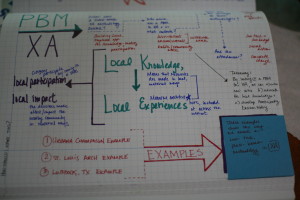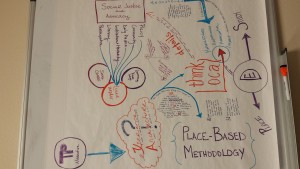XA, Methodology, and Rhetoric
June 14, 2015
These past few weeks, I’ve been finishing up a writing project that discusses experience architecture (XA) in local communities. This project focuses on the ways that XAs can and should adopt decolonizing practices in order to ethically and justly construct XA projects and designs, particularly (though not exclusively) in local communities. This draws on some important decolonial work by Godwin Agboka and Linda Tuhiwai-Smith, Sullivan and Porter’s concept of praxis-based methodology, and Aunque Hommels’ notion of obduracy in cities.
I bought Hommels’ book several years ago and finally found a reason to read it for this project. If you’re interested in urban planning, I highly recommend it. He’s interesting, in particular for his really focused and useful definition of Actor Network Theory, which often gets danced around in rhetoric and technical communication as if it’s self evident (Potts (2013) is a notable exception). He writes that “actor-network theorists….describe technological development as a process in which more and more social and material elements become linked in a network. They investigate attempts by actors to stabilize that network. But the larger and more intricate a network becomes, the more difficult it will be to reverse its realilty. In this way, a slowly evolving order becomes irreversible” (Hommels, 2005, p. 27). In my chapter, I draw more specifically on two of Hommels’ frames for understanding cities as sociotechnical networks: embedded infrastructure and enduring traditions.
I worked from my ATTW Presentation and then, as usual, developed some maps to help me sort through my central ideas. The chapter is under review still, but once it’s forthcoming, I’ll share.

